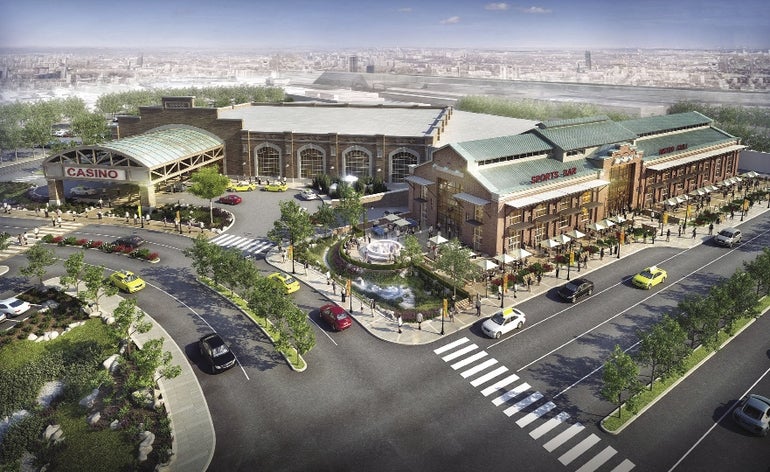After months of emotions that ran high over the possibility of a slots parlor coming to Worcester, efforts to negotiate a deal for the development of a 14-acre site near Kelley Square have been abandoned, taking Central Massachusetts out of the running for the state’s only slots license.
The news came Monday night after recent speculation that talks between City Manager Michael O’Brien and Mass Gaming & Entertainment (MGE) toward a host city agreement had been stalling.
“We have been working in good faith for several months to develop a strong slots casino plan for the city,” MGE Chairman Neil Bluhm said in a joint statement with O’Brien and Mayor Joseph Petty. “This has been a complex undertaking, with a multitude of factors impacting the project, including the high state tax rate for the Category 2 (slots) license, the reasonable mitigation requests from the city and escalating development and operating costs. It recently became clear that we could not reach a mutually satisfactory host community agreement.”
Under the state’s 2011 gaming law, 40 percent of the slot parlor’s revenue would go to the state and another 9 percent to the state’s Race Horse Development Fund.
“Both sides worked very hard to meet the reasonable expectations of the parties but we could not get to a deal and felt it was in our collective best interests to conclude without a host agreement,” O’Brien said.
He added that Petty and the co-chairs of the city’s joint council on economic development and public safety that held two public hearings regarding the agreement supported the decision to end negotiations.
“I am grateful to Neil Bluhm and Mass Gaming & Entertainment for their collective efforts and look forward to the potential of working together in the future. They are world class,” O’Brien said.
Petty echoed O’Brien’s sentiments, saying, “I know Mass Gaming and Entertainment and the city wished to get to terms of a deal … It was not for lack of trying by both parties but, in the final analysis, I believe it is the right decision to end it here and leave the door open for future development opportunities. We welcome the chance to partner with them.”
Bluhm also wrote positively of his experience, saying “We appreciated the professionalism of all those we worked with.”
Recently, there was speculation that negotiations had slowed and city councilors had raised concerns over whether there was enough time to negotiate a deal that residents could vote on before the October deadline, when final applications must be submitted to the state.
MGE, a subsidiary of Chicago-based Rush Street Gaming, had hoped to develop the state’s only slots parlor on a Wyman-Gordon-owned site in the city’s Green Island neighborhood. It said that project, along with a four-star hotel downtown, would be an investment of $240 million and bring 600 jobs to the city.
Last week, reports circulated that the hotel portion of the deal had seemed unlikely. MGE officials had previously said they would only develop the hotel if the slots parlor was approved because it would need to be subsidized with $1 million a year from the gaming facility.
The slots proposal had been contentious from the start, with those against the proposal citing concerns over increased poverty, problem gambling, prostitution and an overall negative image. Meanwhile, proponents favored new jobs and the cleanup of the vacant site.
Earlier Monday, District 4 Councilor Sarai Rivera, whose district includes the proposed site, had said she was in favor of ending negotiations with MGE.
“The reality is it’s not a solid economic development plan in my opinion,” she said. “I think when you look at what we’ve been trying to do in the city for economic development, this does not connect with our vision.”
The other proposal for a slots parlor in the region came from Baltimore-based Cordish Cos., which had sought a $200-million renovation of the Holiday Inn off Interstate 495 in Boxborough to turn it into a hotel and slots site. Last month, that town’s Board of Selectmen voted against entering into negotiations with the firm.
However, Joe Weinberg, a Cordish managing partner, told The Boston Globe shortly after that it was exploring other options and planned to “compete vigorously” for the license.
A spokesman for MGE said today that “Rush Street Gaming has a great deal of interest in Massachusetts and is leaving all of its options open.” However, time is running short for proposals to meet the October deadline.
Sixty to 90 days after the state-required agreement is reached between a host community and developer, residents must vote on whether to approve it. If it’s approved, final applications must be submitted to the state’s gaming commission and are due by Oct. 4.
With Worcester and Boxborough out of the running, two developers remain to vie for the sole license: Plainridge Racecourse in Plainville and Raynham Park in Raynham.
Read more
Briefing: Slots Approval Process
Worcester Council Approves Talks With Slots Developer
Unveiling Worcester Slots Plan, Developers Face Scrutiny
As Worcester Considers Slots, How Has Gambling Impacted Other Communities?
Briefing: Gambling Impact Study
Foxwoods Touts ‘Revolutionary’ Milford Design

